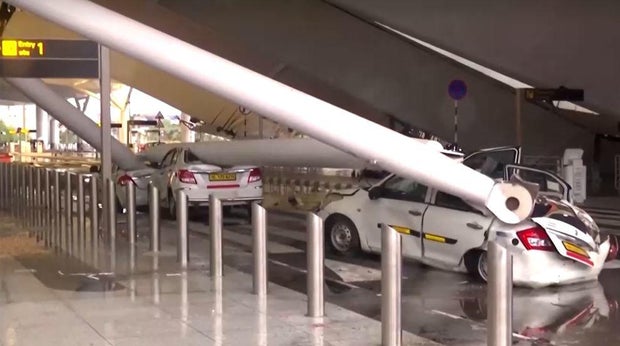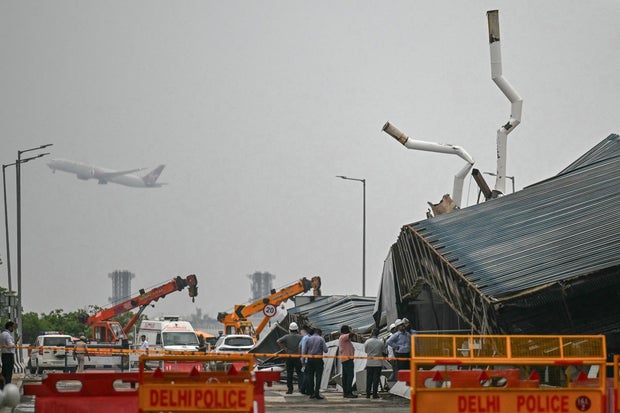CBS News
Massive roof section at Delhi international airport collapses in storm, crushing cars and killing one driver

New Delhi — One person was killed and six others injured early Friday morning when a large section of an exterior roof at Delhi’s main international airport collapsed as heavy rain and strong wind lashed the Indian capital.
The canopy roof and massive metallic support beams that held it up crumpled onto the Terminal 1 departure forecourt at Indira Gandhi International Airport at around 5:00 a.m. local time, landing on at least four parked cars and killing a taxi driver in one of them.
Videos shared online showed several cars crushed under the huge beams.
ANI/Reuters
Terminal 1 is the oldest at Delhi’s international airport, but it was recently renovated and currently hosts about 1,400 flights of the IndiGo and SpiceJet airlines per day. The airport’s Terminals 2 and 3 host other domestic airlines, and international flights.
Dozens of flights were cancelled or diverted to other terminals after the roof collapse as airport authorities suspended all operations at Terminal 1, at least through Friday.
India’s Aviation Minister Ram Mohan Naidu Kinjarapu announced government compensation of 2 million rupees ($24,000) for the family of the deceased taxi driver, and 300,000 rupees ($3,600) for the families of those injured.
Kinjarapu also said experts would examine infrastructure at the terminal, along with all other airports across the country, to ensure safety.
ARUN SANKAR/AFP/Getty
The collapse came as Delhi was battered by a torrential downpour with a thunderstorm. The capital got almost six inches of rain in just three hours on Thursday night, and a total of almost nine inches by Friday morning – the most rainfall Delhi has received on a day in June in 15 years, according to The Indian Express.
The monsoon rains that started lashing Delhi earlier on Thursday did provide relief from deadly heat that has scorched the Indian capital and most other regions of the country — and several neighboring nations — since April, long before the typical onset of peak summer temperatures.
India’s meteorological department has forecast more “heavy to very heavy rainfall” for Delhi over the weekend.
CBS News
Here Comes the Sun: Jack Antonoff and more

Watch CBS News
Be the first to know
Get browser notifications for breaking news, live events, and exclusive reporting.
CBS News
Capturing Moriah Wilson’s Killer – CBS News

Watch CBS News
Be the first to know
Get browser notifications for breaking news, live events, and exclusive reporting.
CBS News
How to watch the Minnesota Vikings vs. Chicago Bears NFL game today: Livestream options, more

Getty Images
The Minnesota Vikings will take on the Chicago Bears today. The Vikings are currently 8-2, an impressive run so far this season, and will be looking to add a fourth win to their current streak after last Sunday’s 23-13 win against the Tennessee Titans. The Bears, on the other hand, are entering this game on the heels of a four-game losing streak after a tough 20-19 loss against the Green Bay Packers last Sunday.
Here’s how and when you can watch the Vikings vs. Bears game today, whether or not you have cable.
How and when to watch the Minnesota Vikings vs. Chicago Bears
The Vikings vs. Bears game will be played on Sunday, November 24, 2024 at 1:00 p.m. ET (11:00 a.m. PT). The game will air on Fox and stream on Fubo and the platforms featured below.
How and when to watch the Minnesota Vikings vs. Chicago Bears game without cable
You can watch this week’s NFL game on Fox via several streaming services. All you need is an internet connection and one of the top options outlined below.
Fubo offers you an easy, user-friendly way to watch NFL games on CBS, Fox, NBC, ABC, ESPN, and NFL Network, plus NCAA football channels. The Pro tier includes 200+ channels and unlimited DVR, while the Elite with Sports Plus tier adds NFL RedZone and 4K resolution. New subscribers get a seven-day free trial and all plans allow streaming on up to 10 screens simultaneously.
You can watch today’s game with a subscription to Sling’s Orange + Blue tier, which includes ESPN, ABC, NBC, and Fox. The plan offers 46 channels with local NFL games, nationally broadcast games and 50 hours of DVR storage. For complete NFL coverage, add Paramount+ to get CBS games, or upgrade with the Sports Extra add-on for additional sports channels like Golf Channel, NBA TV and NFL RedZone.
Watching NFL games, including Fox broadcasts, is simple with Hulu + Live TV, which includes 90 channels, unlimited DVR storage, and access to NFL preseason games, live regular season games and studio shows. The service includes ESPN+ and Disney+ in the subscription.
Want to watch today’s game live on your smartphone? If so, NFL+ streaming service is the solution you’re looking for. It lets you watch NFL Network and out-of-market games on mobile devices, with an upgrade option to NFL+ Premium that includes NFL RedZone for watching up to eight games simultaneously. Note that NFL+ only works on phones and tablets, not TVs.











